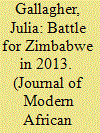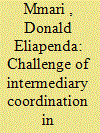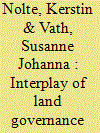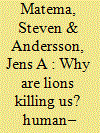| Srl | Item |
| 1 |
ID:
146111


|
|
|
|
|
| Summary/Abstract |
On the face of it, the triumph of Robert Mugabe and ZANU(PF) in the 2013 elections came as a shock, not least to opposition MDC activists. However, after a period of introspection, many have begun to construct a coherent and wide-ranging account of the result which explores opposition shortcomings, and the revived relationship between the electorate and Mugabe's ZANU(PF). This article, based on interviews with political activists conducted three months after the election, outlines and attempts to explain this account. It explores the way in which a politics of polarisation that dominated Zimbabwe in recent years appears to have given way to a politics of ambivalence: where Zimbabweans once viewed their political landscape as one populated by antinomies, they now see their state and its relation to themselves in more complex and ambiguous ways. As a result, Zimbabweans' conception of the state is increasingly coming to resemble Mbembe's formulation of states as contemporaneously ‘organizers of public happiness’ and wielders of arbitrary violence.
|
|
|
|
|
|
|
|
|
|
|
|
|
|
|
|
| 2 |
ID:
146112


|
|
|
|
|
| Summary/Abstract |
Orthodox approaches to development view the market as a key institution for driving economic transformation and for fostering innovation and competitiveness. The working of markets alone, however, does not always lead to improved outcomes such as increase in productivity or production efficiency in the context of smallholders. The role of non-market institutions, therefore, remains important. This paper examines the role of intermediary coordination in addressing constraints to efficiency and productivity of smallholder sugarcane producers in Tanzania. It also makes a contrastive analysis of a different organisational arrangement for smallholder sugarcane producers in Malawi. The key proposition is that while intermediary organisations of cane outgrowers in Tanzania have played a significant role in promoting effective market linkage, an increase in productivity required for competitiveness is limited by the lack of effective horizontal coordination.
|
|
|
|
|
|
|
|
|
|
|
|
|
|
|
|
| 3 |
ID:
146113


|
|
|
|
|
| Summary/Abstract |
This comparative analysis examines how large-scale agricultural land acquisitions are implemented in Ghana and Kenya, using embedded case studies of two specific investment projects. We find that insufficiencies in these countries' land governance systems are partly caused by discrepancies between de jure and de facto procedures and that powerful actors tend to operate in the legal grey areas. These actors determine the implementation of projects to a large extent. Displacement and compensation are highly emotive issues that exacerbate tensions around the investment. We also find that large-scale land acquisitions have a feedback effect on the land governance system, which suggests that large-scale land acquisitions can be drivers of institutional change. We suggest there may be a window of opportunity here to reform these land governance systems.
|
|
|
|
|
|
|
|
|
|
|
|
|
|
|
|
| 4 |
ID:
146110


|
|
|
|
|
| Summary/Abstract |
Descriptions of the Allied Democratic Forces (ADF) – a relatively resilient rebel group in the Congo–Uganda borderland – are almost solely focused upon the rebellion's Islamic extremist characteristics. Through looking specifically at the ADF's recruitment practices, this paper seeks to problematise existing accounts of the group's constitution. It discusses how Islamic extremism has had a significant influence on various aspects of ADF recruitment, and therefore helps to explain particular dimensions of the ADF's composition. Nevertheless, this paper demonstrates that focusing on the role of Islamism alone, leaves a large part of the ADF's story untold – such as the important role played by recruitment networks associated with marginalised and militarised ex-combatants, or the populations of disenfranchised youth in the borderlands. Indeed, unresolved political and socio-economic injustices amongst the people of the Rwenzories have been just as significant motivating factors for joining the rebels as have Islamic sources. Thus, this paper argues that the ADF's recruitment practices and constitution cannot be sufficiently analysed without adequate recognition of the rebel group's position within a borderland context.
|
|
|
|
|
|
|
|
|
|
|
|
|
|
|
|
| 5 |
ID:
146115


|
|
|
|
|
| Summary/Abstract |
An emerging perspective on Community Based Natural Resource Management (CBNRM) in Zimbabwe is that increased authoritarianism in governance has enabled elite capture of wildlife resources and silenced local people's voices. This paper qualifies this perspective, showing how ordinary people continue to raise their concerns about local governance. In the Mbire district, people's interpretations of an upsurge in lion attacks on livestock and people in early 2010 took on a dimension of social commentary on the evolving governance arrangements in the district and beyond. Beneath an apparent human–wildlife conflict lie complex human–human conflicts about access to, and governance of, wildlife resources. Interpretations of the lion attacks built on two distinct epistemologies – a local religious discourse on spirit lions and an ecological one – but invariably construed outsiders as the ones accountable for local problems. This construction of outsiders is also a salient feature of Zimbabwean political discourse. Local voices thus constitute a widely understood discourse of protest.
|
|
|
|
|
|
|
|
|
|
|
|
|
|
|
|